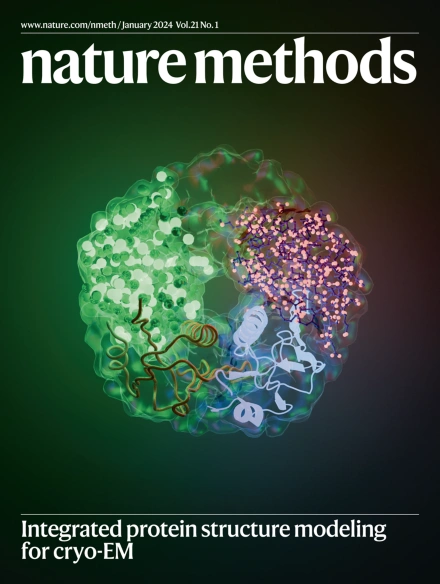蛋白质组规模的重组标准和强大的高速搜索引擎,推进基于交联质谱的相互作用组学。
IF 36.1
1区 生物学
Q1 BIOCHEMICAL RESEARCH METHODS
引用次数: 0
摘要
要推进全蛋白质组交联质谱(XL-MS)数据分析工具的发展,就需要模拟生物复杂性的真实标准。在此,我们开发了控制良好的 XL-MS 标准,其中包括数百种系统混合交联的重组蛋白。我们使用一个标准数据集来指导 Scout 的开发,Scout 是一个带有 MS 可分解交联剂的 XL-MS 搜索引擎。利用其他独立的标准数据集和已发表的数据集,我们对 Scout 和现有 XL-MS 软件的性能进行了基准测试。我们发现,Scout 在速度、灵敏度和错误发现率控制方面都有出色的表现。这些结果说明了我们的大型重组标准如何支持 XL-MS 分析工具的开发和 XL-MS 结果的评估。本文章由计算机程序翻译,如有差异,请以英文原文为准。

Proteome-scale recombinant standards and a robust high-speed search engine to advance cross-linking MS-based interactomics
Advancing data analysis tools for proteome-wide cross-linking mass spectrometry (XL-MS) requires ground-truth standards that mimic biological complexity. Here we develop well-controlled XL-MS standards comprising hundreds of recombinant proteins that are systematically mixed for cross-linking. We use one standard dataset to guide the development of Scout, a search engine for XL-MS with MS-cleavable cross-linkers. Using other, independent standard datasets and published datasets, we benchmark the performance of Scout and existing XL-MS software. We find that Scout offers an excellent combination of speed, sensitivity and false discovery rate control. The results illustrate how our large recombinant standard can support the development of XL-MS analysis tools and evaluation of XL-MS results. This Article reports cross-linking mass spectrometry (XL-MS) standard datasets with fully controlled protein interactions that are an order of magnitude more complex than existing ones. These datasets are used to benchmark XL-MS software and establish a fast, error-controlled search tool for XL-MS with cleavable reagents.
求助全文
通过发布文献求助,成功后即可免费获取论文全文。
去求助
来源期刊

Nature Methods
生物-生化研究方法
CiteScore
58.70
自引率
1.70%
发文量
326
审稿时长
1 months
期刊介绍:
Nature Methods is a monthly journal that focuses on publishing innovative methods and substantial enhancements to fundamental life sciences research techniques. Geared towards a diverse, interdisciplinary readership of researchers in academia and industry engaged in laboratory work, the journal offers new tools for research and emphasizes the immediate practical significance of the featured work. It publishes primary research papers and reviews recent technical and methodological advancements, with a particular interest in primary methods papers relevant to the biological and biomedical sciences. This includes methods rooted in chemistry with practical applications for studying biological problems.
 求助内容:
求助内容: 应助结果提醒方式:
应助结果提醒方式:


